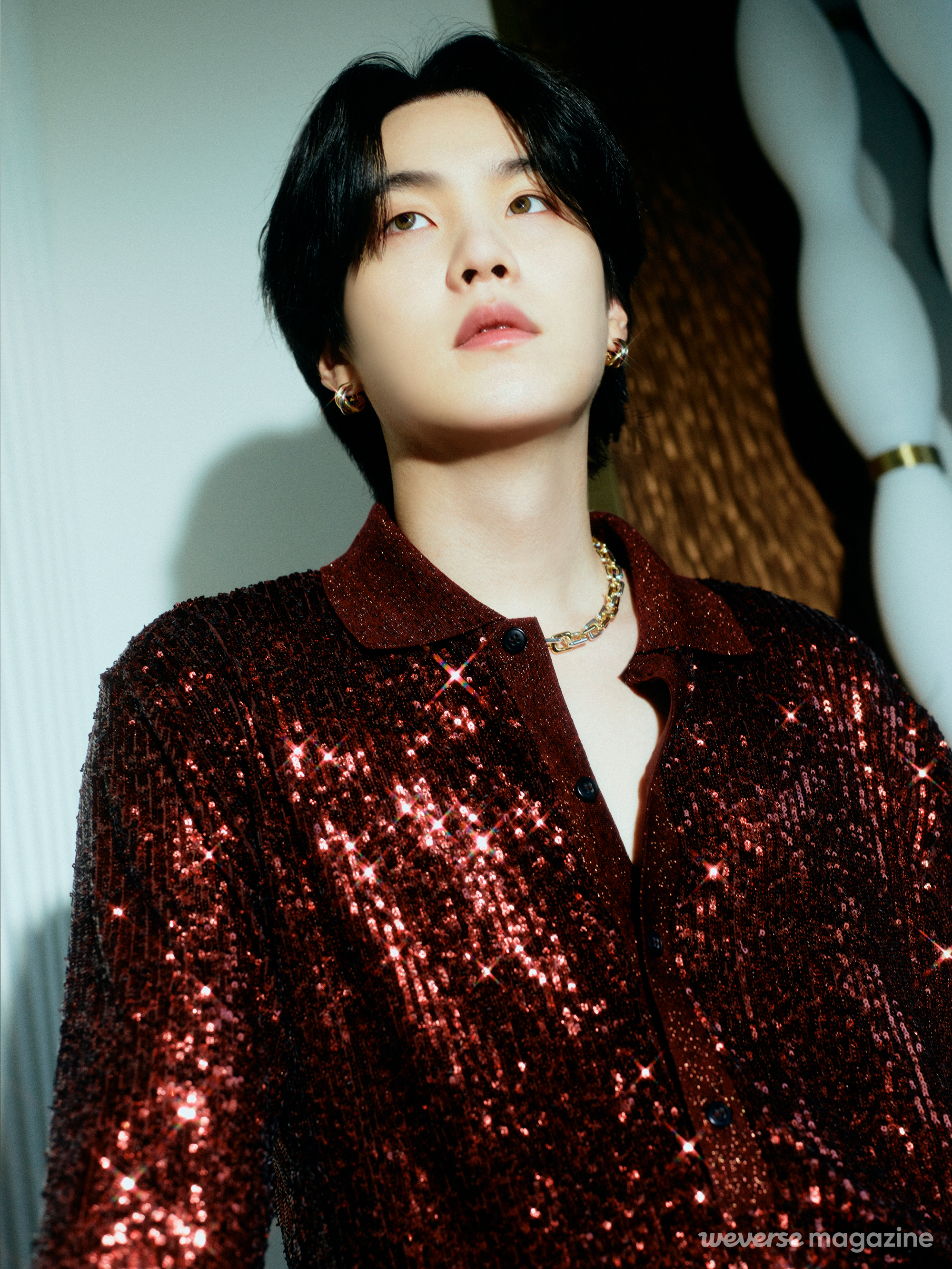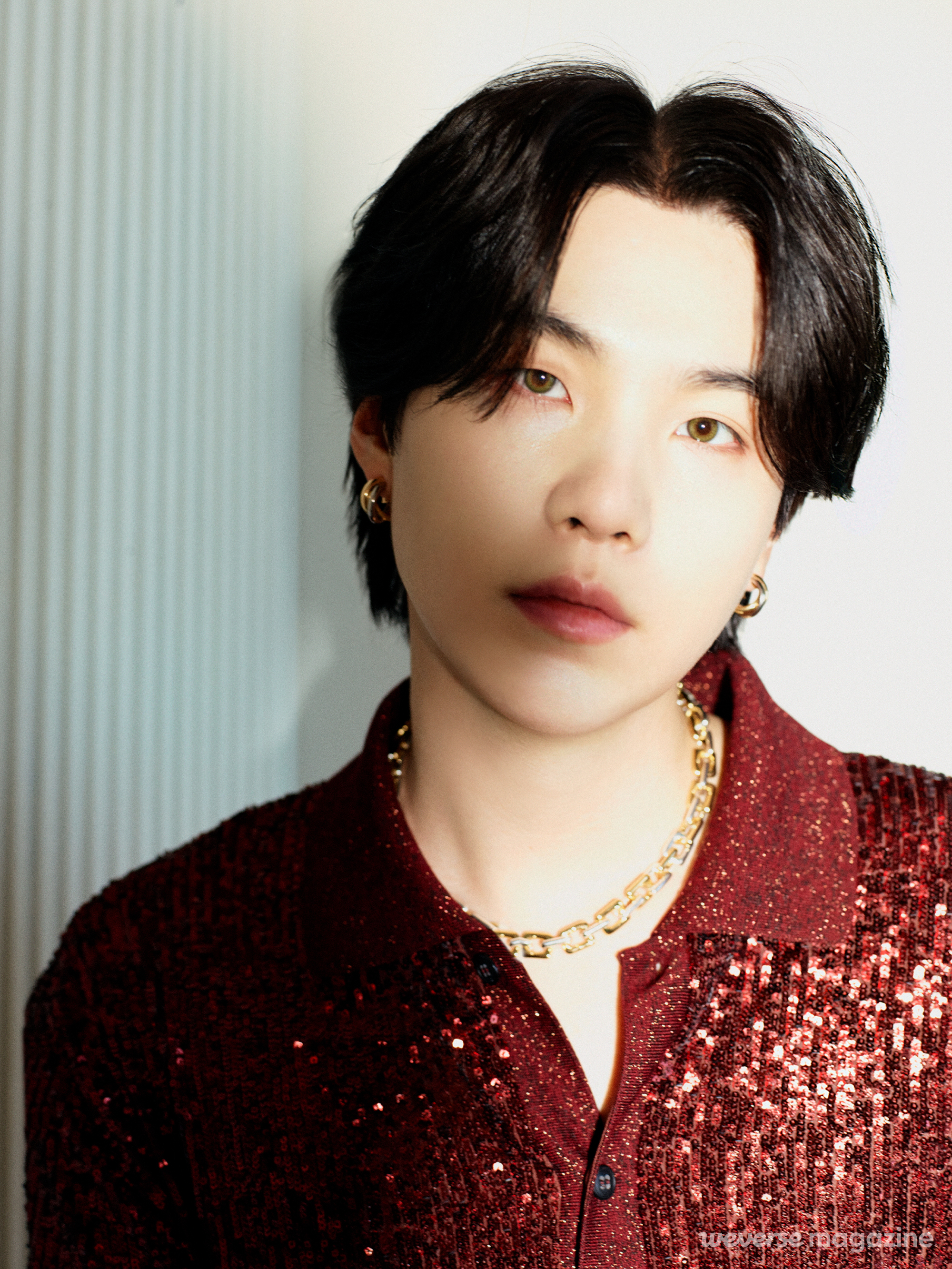SUGA from BTS, SUGA the producer, SUGA as Agust D. And they all make music.
 Necklace by S_S.IL, earrings by Cartier.
Necklace by S_S.IL, earrings by Cartier.
How does it feel listening to “Born Singer,” BTS’ first mixtape song, which is now included on Proof?
SUGA: First of all, I didn’t even know if it could be included on the album. I wasn’t even sure it would be possible, since the original song is so famous, but J. Cole gave us permission. I want to tell him how grateful I am. It’s a song I only could have written back then. I still remember writing it during the first and second weeks we were promoting “No More Dream.” The emotions I felt during that debut time will all evaporate over time, so I had to write it then or never. I even thought about rerecording it since it’s a little over the top looking back, but the intention behind it would be lost if I did. So we just put it in since it wouldn’t be possible to listen back on this period of ours unless it was in a concert. And there might be some ARMY who don’t even know that the song exists. We felt like a lot of who we are went into the song, so we unanimously agreed that it should be included.
The new song “Run BTS” is another fast rap song, like “Born Singer,” but with a different feel to it.
SUGA: It’s a little bit different emotionally. “Born Singer” made me emotional—it’s got a fair bit of emotion in it. For “Run BTS,” we kept saying we wanted to try doing a song in our older style, so we chose a title that both shares its name with our variety show and reflects who we are—always running. All the members have come a long way, and there’s times when we’re exhausted but there’s also things we want to do moving forward, so I think we tried to include those desires as well. And I really didn’t have many opportunities to show off my rap skills on our recent albums. So it made me think of the past, which made me want to write something a little tighter, but rapping it was really difficult. (laughs) We got it recorded quickly, but it had been a long time for me, so I really had to work at it when we were recording. (laughs)
And in your transition from “Born Singer” to “Run BTS,” you made it all the way to the Grammys.
SUGA: We actually practiced really hard. (laughs) We’re not going to do that kind of performance again for quite a while. We had a part that involved clothes and there was a dance break in the middle, too. The process of getting ready was extremely hectic, too: Seokjin got hurt, and Hobi and Jung Kook were in quarantine, so there were times when it was just four of us. It was an experience I won’t soon forget. And the directors were really enthusiastic about the performance. So it was a bit stressful getting ready … but I guess it was also sort of fun, looking back now. The performance went off without a hitch anyway. The part of the performance involving our clothes kept not working out, including during the rehearsal the day before, so I thought we must have had some kind of luck because it ended up going fine on the day regardless. Whenever we try to do something like that, we typically always fail. (laughs) Viewers wouldn’t realize it, but we talk about it a lot between ourselves, so we were really worried, but fortunately it all turned out in the end.
What is it like retracing your memories from a producer’s perspective? “Seesaw (Demo Ver.)” is very different from the originally released version.
SUGA: It’s totally different, isn’t it? I like this version better. (laughs) I had such a hard time working on it. I was in such a bad slump that I had said I would just get a song from somebody else if I couldn’t come up with anything in the end. I felt like I didn’t even want to make a song, but it came to me quickly. I didn’t feel like working on anything; I was just messing around on the piano, knowing I had to do something, when I thought, This melody’s not bad at all, and I ended up making it really quickly. It’s a so-called Shibuya style song, which is a style I personally was into when I was young, and the label reacted to it favorably, too, but they had suggestions for me about working on the arrangement a bit more, so I redid the arrangement. The version that’s getting released now is an instrumental containing a lot of the sentiments I felt in middle school.
Sentiments you felt in middle school?
SUGA: I loved instrumental versions of songs by my favorite artists when I was younger. I would analyze them a lot and dreamed of becoming a producer. It used to have guide vocals as well, but I asked them to take them out. The guide vocals were too hastily sung. (laughs) But when I actually wanted to put the song on the album I couldn’t find the file with the original source for mixing the song. So I went as far as to try and remake it exactly the way it was before, but it didn’t really have the same feel. (laughs) So I said to myself, I have to find this, and then when I was in LA or New York last year, I asked them to hook up all the old PCs and laptops I had sitting around in Seoul and find it, and they finally did. It turned out the second computer I used and the third one looked exactly the same and I couldn’t find it because I wasn’t looking on both of them, just the same computer every time. (laughs)
You really went and dug up an old memory. How did you go from being a middle school student who dreamed of becoming a producer to actually becoming one? “Seesaw (Demo Ver.)” isn’t done in a style that’s popular with many people in Korea, either. I was wondering what kind of changes you went through from then till now.
SUGA: When I was young, I wanted to be a rapper, and I wanted to be a producer, and now I can do both of those any way I want, so I’m doing it all, one by one. That’s also why I use several different names: I wanted to keep them separate. He can do this, too? He can do that, too? He can do music for ads, too? It was just lucky I could meet so many fantastic artists as SUGA the producer, so I think I’m really fortunate to be building a career in that sense.
What sort of influence did working on “My Universe” with Coldplay have on you? Chris Martin came all the way to Korea to record with you, for one.
SUGA: At first I was like, Why is he coming here? (laughs) I mean, with the pandemic, it might have been better to record separately and send them over that way. And I love Coldplay’s music, but I didn’t really know what kind of life Chris Martin has led. But we met, and we talked, and he really wasn’t any different from us. He really related with me when we talked about everyday life and concerns. I realized that all artists who do stadium tours face similar hardships. It was nice knowing I could be friends with someone like him.
I feel like you and PSY influenced each other through “That That (prod. & feat. SUGA of BTS).” We already knew you were producing and featuring on the song, but you had a lot of screen time in the music video, too. (laughs)
SUGA: I was just going to write the song and dip out, but then he said, “You have experience featuring on other songs, don’t you?” I was like, “Featuring could be okay …” And I did it. Then he said it would be a bit weird if I wasn’t in the music video, and said, “Just try it once and see how it goes,” and I said, “I’ll just do the verse and be off,” and the next thing I know, I’m dancing, too. (laughs) He showed me the rough version and said, “Only do it if you like what you see,” so I did it, and I thought it was fun since it was so much different from his previous choreography. I did the music video purely for all the ARMY watching. (laughs)
PSY’s style is very distinct, so how did you end up working with him? It’s an interesting collaboration.
SUGA: Exactly. That’s what I wanted! I’ve worked on a lot of different songs as a producer, but non-ARMY mainly know the well-known ones, and those are usually the ones by people like IU or Heize so I think they feel like the songs have similar vibes. But I had a song from before that I wanted to have included on an album but couldn’t, and I thought it would be a good match for PSY from the outset.
So PSY became your client. What specifics did he ask for?
SUGA: At first I just wanted to give the song to him, but he had a few requests, so I redid the arrangement and that was the beat you hear today. That process of back-and-forth was really fun. At first I decided I would just play it for him, and if he didn’t like it, I’d just let it go, but PSY said that he had been working on music for 22 years and now he needed some young blood, and said he wanted to do the song. I think we both found the experience fun. No matter how hard he tried to keep his style out of it, the parts he wrote have his fingerprints all over them. (laughs)


